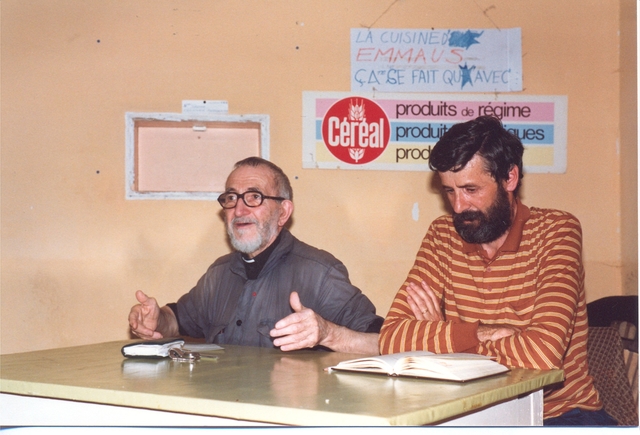The origins of Emmaus (1975)
During a speech he gave at Emmaus Laterina in Italy on 26 October 1975, Abbé Pierre reminded us of the importance of the communities in the foundation of Emmaus: the wealth brought by the diversity of companions and their opinions, the political impact that communities can have on issues such as housing and the importance of being vigilant in order to maintain balance within the communities. Being careful not to strive to perfect community life and its way of working, so that the least skilled and the least stable can always find their place. Being careful not to transform the communities into businesses and to make sure the work is adapted to the people, and not the other way round.
Speech by Abbé Pierre at Emmaus Laterina, Italy, on 26 October 1975
"These communities are the cornerstone of Emmaus' work. Then there are many friends, all the young people who come to the camps are friends of Emmaus, along with the many people in the town who know the community. In the 26 years since it began, we could make a long list of people who are in very different situations, with very different opinions, and whose way of life has undergone great changes because they have encountered the thought-provoking reality of the communities. In France, where there are now 51 communities and almost 1,500 companions, all completely free to leave when they want and to come back if there is space, on several occasions the communities’ work has had a real political impact: on the issue of housing, issues facing people with disabilities, the issue of voluntary work in helping developing countries. And in other countries of Latin America or in Rwanda, we see questions being raised due to the very existence of the communities. The groups of friends sometimes take on responsibilities in managing creations made with the profits from the communities’ work. When the community gives its profits for an initiative, they must try to always find enough, a sum of money which is large enough so that we are not just handing out small gifts to poor people, enough to ensure we can start an important initiative, but we must never give so much that it completes the initiative. I always say to friends, it is a poisoned gift you are being given. Because we give you enough so you can do some small things, and not so much as to complete the job. You will be forced to find the means to complete it. You will have been compelled to examine the problem, and then you will have to find the necessary means to complete it with the municipality, with Parliament, with all the organisations. This is where one form of provocation lies. And lastly, before we move on to your questions…
There are two dangers to Emmaus. One danger is wanting to perfect the way of life of the communities, their method of working; perfecting this beyond a certain extent, taking on commitments to carry out something technically bigger than the ordinary collection work of a ragpicker. We frequently see communities around the world which try to push the community to do more, technically, than rag picking work. I do not know of any examples where this has ended well. Why did it end badly? Because to be able to perform this greater work, gradually we are forced to exclude those who are less skilled, less strong, less stable. And there are examples of when a commitment to do some work has been taken on, and we are forced to hire completely normal workers and we end up becoming like any old company. It is not worth it. It is not bad, it is good - but it is not our mission. Our mission is to have an open door, up to the point where mental health issues prevent us from doing so. The door is open so that all those who are suffering in society, materially or morally, can come in, temporarily or for life. And I often say to new leaders and to friends: “Watch out, you need to have a good think when you arrive at a community; if you were used to business, a normal company, you have to take your head and turn it upside down. Because if you work in a company, for Fiat or whoever, well, what happens? You say, I want to produce this, so to produce this I need these types of people, I will advertise, I will recruit, then if the person is good, everything is fine, and if the employee is not good, you show them the door. When you come to Emmaus it is exactly the opposite. You open a door, you look at who enters and you wonder: What can we do together with this man, or that one, as he is now? And the work is continuously adapted to those who arrive. It is exactly the opposite of a company and this must be clearly understood. Because otherwise…for example, there are leaders who sometimes say: Father, it’s wonderful, in my community there are never any drunk men. I reply that I’m not sure that this is wonderful, as have you managed to cure all the alcoholics who arrived? Or is it that you have closed the door on all the alcoholics who wanted to come in? This is the problem. And sometimes saying my community is more perfect than the others means that it is not the best.."
Discover the full audio of the speech (in French with Italian interpretation):
